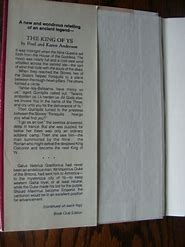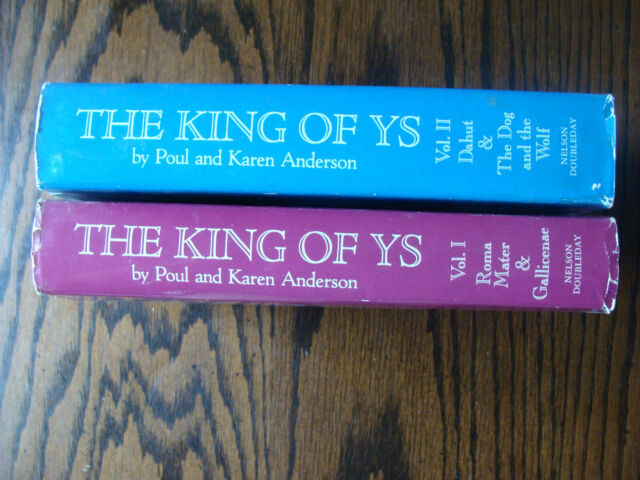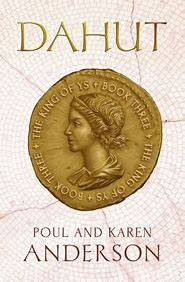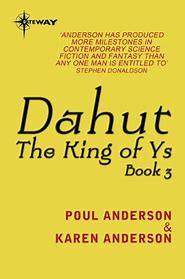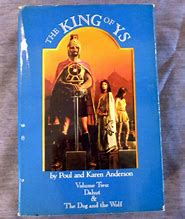The Dog And The Wolf.For a final time, we follow the passage of the seasons in a volume of The King of Ys.
"Most fruit trees were done with blooming, but a new loveliness dwelt in Liguria." (III, 2, p. 67)
"That was a chilly year, but towards midsummer a spell of heat set in and lasted a while." (VI, 1, p. 113)
"Mons Ferruginus and the woods beyond the Odita blazed with autumn, red, russet, yellow under the earliest sun-rays." (VII, 2, p. 137)
"...To this place came Bishop Martinus at the beginning of winter's pastoral rounds." (VII, 3, p. 145)
"The new year might be more hopeful than the last. Weather grew springlike well before the vernal equinox." (VIII, 2, p. 153)
"Easter Eve was clear." (VIII, 4, p. 163)
"On Easter morning..." (VIII, 5, p. 166)
"Immediately after Easter..." (IX, 1, p. 170)
"The feast of St Johannes had taken unto itself the ancient rites of Midsummer, but otherwise they had changed little." (IX, 3, p. 182)
"That summer was cruel to sandy Audiarna." (X, 2, p. 192)
"...Noontide brimmed with sun, warmth, and harvest odours. Bees buzzed in clover. The view over the Odita was of men, women, and animals busy across the fields, children following to glean." (X, 6, p. 205)
"Autumn blew grey from the north. Wind bit." (X, 7, p. 207)
"Midwinter's early darkness had fallen..." (XI, 1, p. 210)
"Spring cast green over the low land around Deva. Trees budded and bloomed..." (XI, 2, p. 216)
"Winter heaven hung featureless grey." (XIII, 1, p. 250)
"A light snow fell." (XIII, 4, p. 260)
"Willows had leaved, oak and chestnut were beginning to, plum trees bedecked themselves in blossom... Migratory birds were coming home." (XIII, 5, p. 262)
"The galleys dropped anchor. They had grounded on many a strand this springtime..." (XIV, 2, p. 268)
"Rain fell in serried silver. Wind dashed it against walls and windowpanes. The first breath of autumn was in it. Gloom and chill filled the bishop's house..." (XV, 5, p. 296)
"In the dark of the moon before winter solstice, Confluentes burned." (XV, 8, p. 305)
"Springtime dusk. The air was soft, odours of greening and blossoming not yet cooled out of it." (XVI, 1, p. 311)
"The men from the currach reached holy Temir a few days after Beltene." (XVI, 2, p. 317)
"Harvest brought wholeness." (XVI, 5, p. 328)
"That year Beltene in Mide was the greatest and most magnificent ever heard of since the Children of Danu held Eriu." (XVII, 3, p. 337)
"On a day in autumn when the wind went loud and sharp..." (XVIII, 3, p. 362)
"The Black Months need not be dark." (XVIII, 4, p. 365)
"Spring returned, made green the graves of winter and strewed them with flowers. Days grew longer than night. Migratory birds trekked home." (XIX, 1, p. 372)
"Autumn weather came earliest to the high midland of Armorica. First the birches grew sallow and their leaves departed on chilly winds, then red and brown and yellow rustled all over the hills." (XX, 2, p. 391)
"A sharp summer was followed by a hard winter. Snowfalls, rarely seen in Armorica, warmed air a little for a short while, then soon a ringing frost would set in." (XX, 3, p. 397)
"As the year spun down to solstice, cold deepened. The Odita and Stegir lay frozen between banks where the snow glittered rock-hard. Icicles hung from naked boughs, eaves, battlements, like spears turned downward." (XX, 4, p. 401)
"Skies hung heavy, low above old snow and skeleton trees, a world of greys and whites." (XXI, 2, p. 411)
"The sun drew nigh to midsummer. This was a beautiful year, as if to make up for last. Croplands burgeoned..." (XXI, 7, p. 427)
"...Summer brooded in majesty on ripening grain and fragrance-heavy forests. There often the only sounds were bees at work in clover and the call of a cuckoo." (XXII, 1, p. 431)
"The long day of Armorican summer wore on." (XXII, 2, p. 435)
"Rain came, not cruelly slashing as in last year but a mildness that swelled the crops to full ripening." (XXII, 4, p. 443)
"That year they kept the Feast of Lug in Armorica without their chiefs." (XXII, 6, p. 448)
"Harvest was done, the last sheaf consecrated to the Maiden, the wether chosen as Wolf of the Fold sacrificed, a branch hung with ears of grain brought into house or barn." (XXIII, 1, p. 451)
"The storks had long since departed, and now skies were full of other wings trekking south." (XXIV, 2, p. 472)
"...The first fallen leaves scrittled across the land." (XXIV, 3, p. 475)
"Equinox almost a month behind them, nights drew in fast." (XXIV, 5, p. 484)
"The day before solstice hung still and murky." (XXV, 1, p. 490)
"Snow began to fall..." (XXV, 2, p. 495)
"Midwinter nights fell early and dwelt late in Armorica, day hardly more than a glimmer between them, but this one was ice-clear." (XXV, 3, p. 497)
Fast-forwarding through the volume for these seasonal references, we notice also how much time passes for the characters. Gratillonius marries and starts a family.




